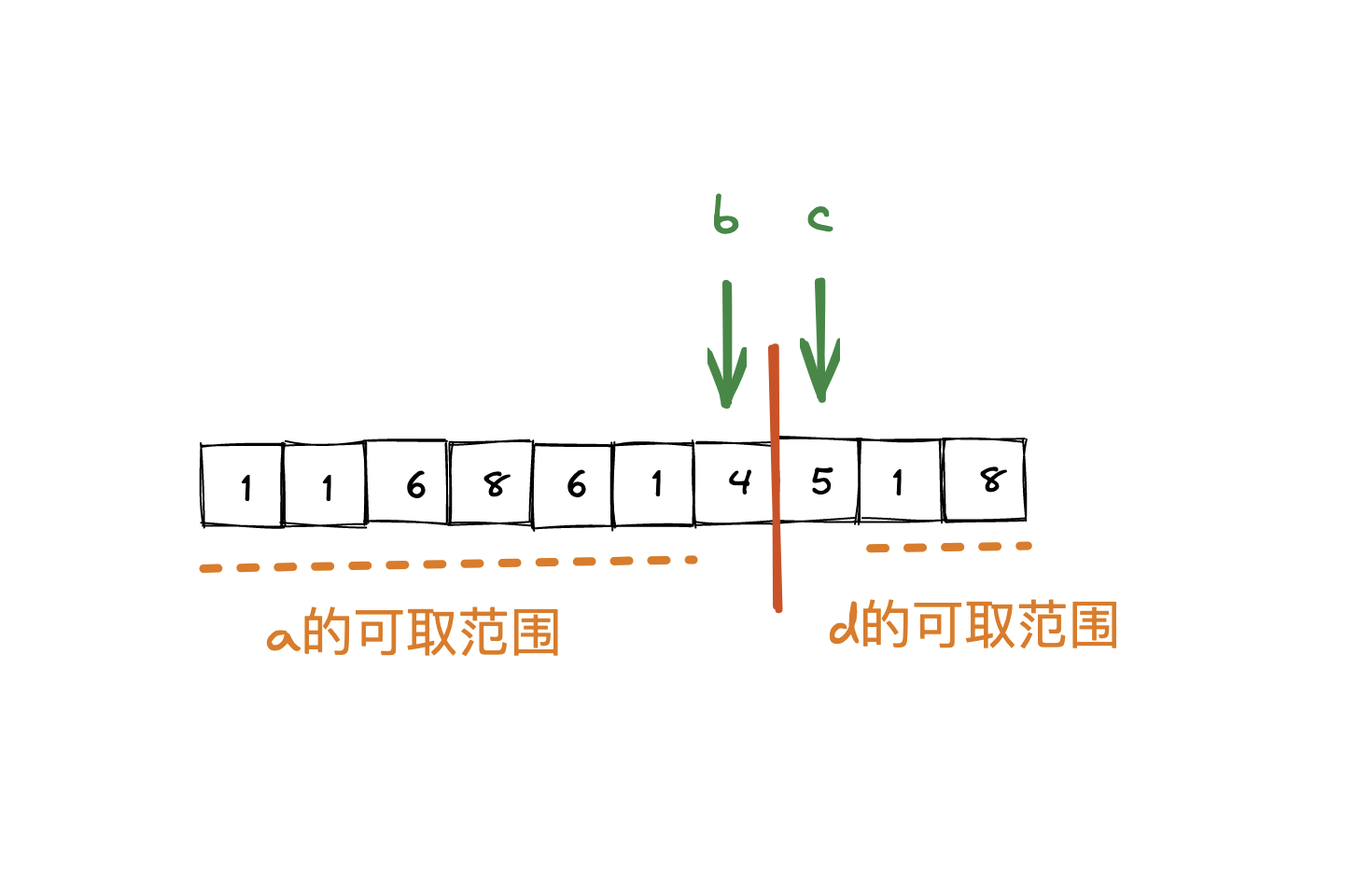[LeetCode] 1995. Count Special Quadruplets
Given a 0-indexed integer array nums, return the number of distinct quadruplets (a, b, c, d) such that:
nums[a] + nums[b] + nums[c] == nums[d], anda < b < c < d
Example 1:
Input: nums = [1,2,3,6] Output: 1 Explanation: The only quadruplet that satisfies the requirement is (0, 1, 2, 3) because 1 + 2 + 3 == 6.
Example 2:
Input: nums = [3,3,6,4,5] Output: 0 Explanation: There are no such quadruplets in [3,3,6,4,5].
Example 3:
Input: nums = [1,1,1,3,5] Output: 4 Explanation: The 4 quadruplets that satisfy the requirement are: - (0, 1, 2, 3): 1 + 1 + 1 == 3 - (0, 1, 3, 4): 1 + 1 + 3 == 5 - (0, 2, 3, 4): 1 + 1 + 3 == 5 - (1, 2, 3, 4): 1 + 1 + 3 == 5
Constraints:
4 <= nums.length <= 501 <= nums[i] <= 100
统计特殊四元组。
给你一个 下标从 0 开始 的整数数组 nums ,返回满足下述条件的 不同 四元组 (a, b, c, d) 的 数目 :
nums[a] + nums[b] + nums[c] == nums[d] ,且
a < b < c < d来源:力扣(LeetCode)
链接:https://leetcode.cn/problems/count-special-quadruplets
著作权归领扣网络所有。商业转载请联系官方授权,非商业转载请注明出处。
这道题也属于 X sum 那一类的题。暴力解不难想到,就是用4个指针分别去遍历题目中的 a, b, c, d 四个下标。然而这道题的最优解是 O(n^2)。
因为题目有对下标做要求,所以这道题是不能排序的。
a < b < c < d
题目要我们找的是满足这个公式的四元组,nums[a] + nums[b] + nums[c] == nums[d] 且 a < b < c < d。我们可以把这个等式变成 nums[a] + nums[b] = nums[d] - nums[c],然后用 hashmap 去记录所有 unique 的 nums[d] - nums[c]。既然时间复杂度降了,那么势必会有空间上的牺牲,以空间换时间。
至于具体做法上,需要有一些技巧。这里我们用一个 for 循环去遍历 b 的下标,对于每一个 b 的下标,我们可以找到 c 和 d 的下标的范围(肯定在 b 的右侧,其中 c = b + 1)。参考下面这个截图(引用)。

当 b 的位置固定的时候,我们定义 c = b + 1,然后用另一个指针去遍历所有的 d,这样我们就能得到所有 d - c 的组合。而且随着 b 不断往左移动,我们对 c 的取值范围也是不断变大的,最终我们会得到所有 d - c 的组合。此时我们再用第二个 for 循环,得到所有 a + b 的组合,看看hashmap中是否已经存在,若存在,则说明我们找到了一个组合满足 nums[a] + nums[b] = nums[d] - nums[c]。
时间O(n^2)
空间O(n)
Java实现
1 class Solution { 2 public int countQuadruplets(int[] nums) { 3 int len = nums.length; 4 int res = 0; 5 HashMap<Integer, Integer> map = new HashMap<>(); 6 for (int b = len - 3; b >= 1; b--) { 7 for (int d = b + 2; d < len; d++) { 8 map.put(nums[d] - nums[b + 1], map.getOrDefault(nums[d] - nums[b + 1], 0) + 1); 9 } 10 for (int a = 0; a < b; a++) { 11 res += map.getOrDefault(nums[a] + nums[b], 0); 12 } 13 } 14 return res; 15 } 16 }





【推荐】国内首个AI IDE,深度理解中文开发场景,立即下载体验Trae
【推荐】编程新体验,更懂你的AI,立即体验豆包MarsCode编程助手
【推荐】抖音旗下AI助手豆包,你的智能百科全书,全免费不限次数
【推荐】轻量又高性能的 SSH 工具 IShell:AI 加持,快人一步
· 地球OL攻略 —— 某应届生求职总结
· 周边上新:园子的第一款马克杯温暖上架
· Open-Sora 2.0 重磅开源!
· 提示词工程——AI应用必不可少的技术
· .NET周刊【3月第1期 2025-03-02】
2021-05-17 [LeetCode] 1171. Remove Zero Sum Consecutive Nodes from Linked List
2020-05-17 [LeetCode] 1452. People Whose List of Favorite Companies Is Not a Subset of Another List
2020-05-17 [LeetCode] 227. Basic Calculator II
2020-05-17 [LeetCode] 224. Basic Calculator